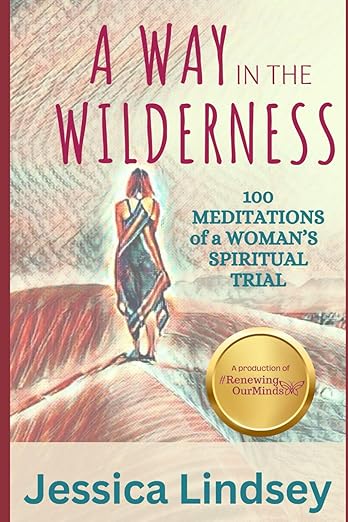The following content may contain affiliate links. All scriptures appear in the New International Version translation. Some biblical text has been highlighted for emphasis.
I believe every Christian woman will enter a wilderness season at some point in her lifetime. Perhaps it will come through a significant loss. Others may experience heavy turmoil in their health or finances. For many, it’s a multitude of stressful factors heaped up together. But God is not leading women to the wilderness as a punishment – there is a divine, refining purpose to this season.
Here are 3 big reasons God leads believers into a wilderness season:
1. The wilderness tests hearts
When I was living on nothing, raising my four sons, I was part of a small online prayer group. I needed their support. At times, I had anxiety so strong I felt like my legs were burning. I explained to these women that though I was going through the most stressful period of my life, I also felt the closest to Jesus I ever had. One woman said that made perfect sense to her, sharing a quote that has stuck with me through the years:
“When you squeeze a Christian, Christ should come out.” Just like squeezing an orange would produce orange juice, life’s pressures should show what we are made of also.
I have learned through my own wilderness journey that this squeezing is an intentional act of God. He brings us to a place where our comforts in life are stripped away. We’ve got mud on our face from the fallout of whatever has brought us to this place. We’ve lost our honour and sometimes even our dignity. Yet, if our relationship with God is real, we will be soaring spiritually to new heights at the same time. If it is not real, we may find ourselves sinking to lows we never conceived possible, some Christians even some falling away. Christ should come out when we are squeezed, but sometimes anger, bitterness and resentments are the results of the discomfort and pain the wilderness brings about.
After their escape from Egypt, the Israelites followed Moses into a dry, barren wilderness where they wandered for 40 years. As the miracle of God parting the Red Sea faded from their minds, the Israelites began to gripe and complain, some even saying they would prefer their old life of slavery to the place God had brought them (Exodus 14:12).
But God did not bring His chosen people to the wilderness to make them happy. He brought them there to test their hearts.
“Remember how the Lord your God led you all the way in the wilderness these forty years, to humble and test you in order to know what was in your heart, whether or not you would keep his commands.” Deuteronomy 8:2
When the wilderness hits, God is watching. He is using this season of hardship to see whether His followers will remain faithful to him even when life becomes difficult. Our trials and tests will prove whether we truly belong to God and His kingdom or to the world and all of its false promises of personal glory.
The Apostle Peter also warned this time of testing was coming and why:
“Dear friends, do not be surprised at the fiery ordeal that has come on you to test you, as though something strange were happening to you.” 1 Peter 4:12
Peter assures us that those who suffer with Christ will have His glory ultimately revealed to them. Though we will have pain during our testing time, this season shows God the quality of our faith – something far more important than our temporal comfort.
“…though now for a little while you may have had to suffer grief in all kinds of trials. These have come so that the proven genuineness of your faith—of greater worth than gold, which perishes even though refined by fire—may result in praise, glory and honor when Jesus Christ is revealed.” 1 Peter 1:6-7
2. The wilderness pulls down pride
I was once a woman filled with pride. I believed there was nothing I couldn’t accomplish in my own power if I set my mind to it. I was heady, high-minded, too certain of things (especially my own righteousness), haughty, arrogant, stuffed up, unyielding, unmalleable and in every way stubborn. At the time, I thought these behaviours were signals of my strength, determination and ambition – things the world applauds. It wasn’t until the striping away of it all that I came to understand that it was in fact pride all along and it standing in the way of God’s desire to shape me into who I am meant to become in His son.
I stayed full of pride until Christ chose me out of the world and began the refining process. This journey took a sharp turn when I entered a lengthy wilderness season following an abrupt divorce, entering into a time where I had heaps of responsibility with my four young sons and no family support.
As Proverbs 16:18 states: “Pride goes before destruction, a haughty spirit before a fall.”
Pride had been telling me that if I would be able to save my marriage if I only tried harder, prayed longer, or had strong enough faith. This pride (along with well-played deception from the enemy), led me to accept living circumstances which were neither safe nor sane. I believed my will would be done; that God would repair my broken marriage and make my family whole for me, neverminding that my spouse at the time showed no intention of making any of the changes I demanded.
I wanted God to do what I wanted, not what He wanted, so that I wouldn’t have to face the miserable consequences of my poor decisions.
When my marriage ended anyway, I found myself in a deep pit with no earthly means of getting out. God knew I’d end up where I was and He’d had a plan all along. He scooped my up, peeling off the pieces of my pride one at a time, one day at a time. I started becoming who He wanted me to be – a woman who relies on His strength, ability and power to succeed.
3. The wilderness produces humility
“Pride brings a person low, but the lowly in spirit gain honor.” Proverbs 29:23
When Christ was on the earth in the flesh, He taught that He wanted us to be “meek and lowly in heart” like him (Matthew 11:29). In our culture today, being meek and lowly sounds like being weak and allowing people to stomp all over us. Perhaps this worldly image of the words was influenced by the enemy in his evil hopes to prevent people from pursuing these things. In reality, meek means gentle, and lowly in heart is humility – a purity of self-reflection, knowing that any goodness within us comes from God and not ourselves.
The wilderness dismantles our ego-driven works we were once arrogant about, teaching us that without God, we would be nothing, have nothing and could do nothing, as illustrated in John Chapter 15:
“I am the true vine, and my Father is the gardener. He cuts off every branch in me that bears no fruit, while every branch that does bear fruit he prunes so that it will be even more fruitful.” This pruning process is the cutting away of things that are impeding our growth, especially our pride.
Jesus teaches that we cannot “bear fruit” without Him. “…No branch can bear fruit by itself; it must remain in the vine. Neither can you bear fruit unless you remain in me.” (John 15:4)
When we suddenly cannot rely upon our own intelligence or talents to get us out of our mess and instead have to wait patiently for God to help, pride is slowly replaced with humility – a trait that is much more desirable to God and useful to us in our influence among other people.
I discovered that though the wilderness season was unwanted and painful, it was effective. The haughty stubbornness slowly wore away. I began to look more like Christ and less like the world. The difference means that a person who was once a problem for God’s kingdom is now someone capable of serving Him in a meaningful way.
“Humility is the fear of the Lord; its wages are riches and honor and life.” Proverbs 22:4
God’s desire is to pull out pride, replace it with humility and reward us with to give His people spiritual wealth, honour among people and more life. I like the woman I am today, and that would have been impossible without the wilderness season I lived through.
“…because the Lord disciplines the one he loves, and he chastens everyone he accepts as his son.” Hebrews 12:6
The wilderness is an act of love; it’s a disciplinary process that tests our hearts, dismantles our pride and produces humility so that God is able to ultimately reward us and use us for His purpose.
























